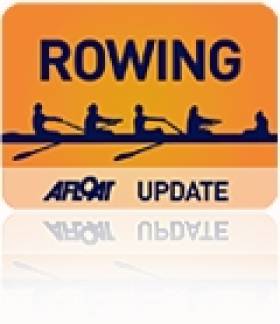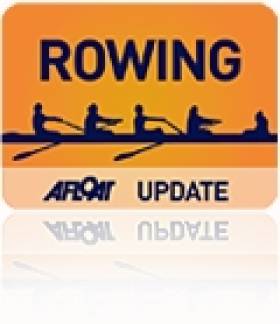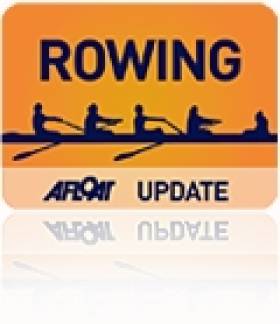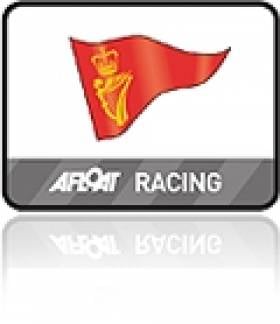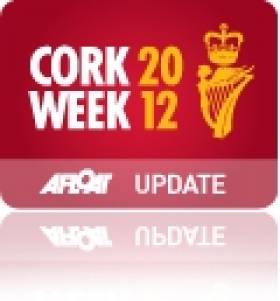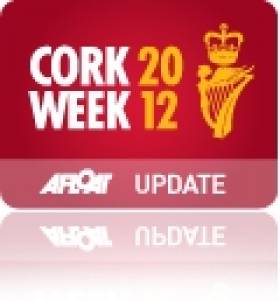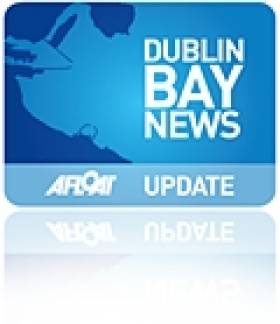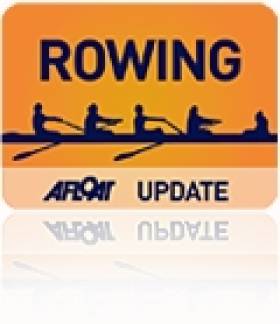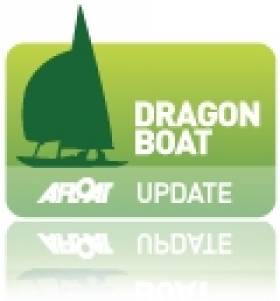Displaying items by tag: Regatta
# ROWING: A decision will be made this afternoon on whether this weekend’s two big regattas at the National Rowing Centre will go ahead. The Skibbereen Regatta is fixed for Sunday and the Irish Universities and Schools’ Championships for Saturday, but both are in doubt because of the forecast of bad weather around the Co Cork venue.
# ROWING: Commercial topped the rankings with 11 wins and seven second places at the Neptune Head of the River at Islandbridge today. A Commercial/Neptune senior eight won the final race of the day, beating English visitors Broxbourne by half a length in three minutes 46 seconds, the fastest time of the regatta. Colm Dowling, the number seven man in the crew, had earlier won the senior single sculls title. The regatta was held in cold, sunny conditions and had a particularly big entry from Northern Ireland clubs Bann and Portora.
Neptune Regatta, Islandbridge (Selected Results)
Men, Eight – Senior: 1 Commercial/Neptune (W Yeomans, I Kelly, L Hawkes, AJ Rawlinson, F Groome, J Graham, C Dowling, M Maher; cox: G Connolly) bt Broxbourne ½ l 3:46. Intermediate: Broxbourne bt Portora 1l, 3:54. Novice: Belfast RC bt Bann 1l, 4:12. Junior 16: Portora A bt Bann 2 ¼l, 4:07. Junior 18: Neptune bt Commercial 3l, 3:59. Masters: Old Collegians/Three Castles bt Waterford BC 3l, 5:21.
Fours – Intermediate One, coxed: Portora bt Bann 1l, 4:24. Novice, coxed: Belfast bt Trinity 1¾ l, 4:52. Junior 18, coxed: Portora bt Neptune 1½ l, 4:25. Masters, coxed: Old Collegians bt Carlow 2l.
Sculling, Quadruple – Novice, coxed: UCD bt Trinity 2 ½ l, 4:32. Junior 18: Neptune bt Commercial easily 4:16. Junior 16, coxed: Commercial bt Portora 2 ½ l, 4:29. Junior 15, coxed: Portora bt Bann 1ft, 4:41.
Double – Junior 16: Waterford bt Offaly easily. Junior 15: Commercial bt Athlone A easily, 5:04.
Single – Senior: Commercial (Dowling) bt Three Castles (Corcoran) easily, 4:59. Intermediate: Garda (Kelly) bt Three Castles (Corcoran) 2 ¾ l, 4:49. Novice: UCD (Toland) bt Sligo (Patterson). Junior 18: Commercial (W Yeomans) bt Athlone (Munnelly) disq. Junior 16: Athlone (Munnelly) bt Waterford (Goff) 2 ¾ l, 4:58.
Women
Eights – Intermediate: UCD bt Commercial 2ft, 4:22. Novice: Bann bt Belfast RC easily, 4:34. Junior 16: Portora A bt Portora B easily, 4:50.
Fours – Novice, coxed: Trinity A bt Belfast B 2¾ l, 5:04.
Sculling, Quadruple – Novice, coxed: Commercial bt Neptune ¾ l, 5:21. Junior 18: Commercial bt Neptune easily, 4:54. Junior 16, coxed: Carlow bt Portora 5:04. Junior 15, coxed: Bann A bt Athlone 3½l, 5:11.
Double – Junior 16: Neptune B bt Neptune A. Junior 15: Bann bt Athlone 1l, 5:38
Single – Senior: Commercial (S Dolan) bt Commercial (E Lambe) easily, 5:32. Intermediate: Trinity (O’Brien) bt Commercial (Foley) easily, 5:27. Novice: Bann (Barry) bt Commercial (Foley) 3l, 5:25. Junior 18: Neptune (Kavanagh) bt Carlow (Byrne) ½ l, 5:36. Junior 16: Commercial (Lambe) bt New Ross (Nolan) 2ft.
Neptune Rowing Regatta To Stage Over 200 Races
# ROWING: Neptune Rowing Club will hold their 31st annual regatta on Saturday over a 1200 m course at Islandbridge. This is the first regatta of the season in the Irish rowing calendar, and it has attracted a big entry, with 204 races. Because of the large entry there will be 26 preliminary races held on the Friday evening between 6 and 7.30 pm.
Racing on Saturday is scheculed from 8.30 am to 6.24 pm, with a race every three minutes throughout the day. The feature race will be the men's senior eights at 5.51 pm, which is a straight final between a Neptune/Commercial composite crew and a visiting English crew from Broxbourne Rowing Club with Irishman Albert Maher on board. Broxbourne will also compete in the men's intermediate eights and Albert Maher will compete in the senior sculls.
The women's senior single sculls is a straight final between Sarah Dolan and Eimear Lambe, both from Commercial. The men's novice single sculls has attracted an entry of 37 scullers, with 31 entrants from Dublin University!
Other visiting crews to the regatta are Portora, Bann and Belfast Rowing Clubs from Northern Ireland, as well as a good representation from all over Leinster. There will also be crews from Waterford Boat Club and Fossa from Munster and Sligo R.C. from Connaught.
RCYC Hosts 'Moby Dick' Screening
#ROYAL CORK - It was "uncharted waters" for the Royal Cork Yacht Club in Crosshaven last night as it hosted its first ever film screening, a showing of the John Huston classic Moby Dick.
The epic adventure, starring Gregory Peck, was shot on location in nearby Youghal, and tells the story of the obsessed Captain Ahab's pursuit of the titular whale.
Joleen Cronin of the Crosshaven Film Club told the Irish Examiner: "There are lots of people throughout Cork who were involved in the making of the film and it’s a real celebration of movie making and special effects for its time."
The screening is hoped to be the first of many special events at the world's oldest yacht club, which will be hosting the biennial Cork Week regatta from 7-13 July.
Hong Kong, Holland and South Africa Entries Boost Cork Week
#CORK WEEK – South Africa's Tokoloshe, Holland's Tonnerre de Breskens, Hong Kong's Signal 8 and Ireland's own Ker 39 Antix will make up one of the most competitive class zero divisions for Cork Week in many years and the early news such an international line up is bound for Cork Harbour is a major advance for Crosshaven organisers, Royal Cork Yacht Club.
From Cape Town, South Africa Mike Bartholomew will be racing at Cork Week with his Mills 40, Tokoloshe. The sleek blue hull has been tremendously successful and was in fine form last year, winning the prestigious Britannia Cup at Cowes week. A previous winner of at the Scottish Series and RORC Easter Challenge, Tokoloshe has a fine racing pedigree and represented South Africa in the 2010 Rolex Commodores' Cup.
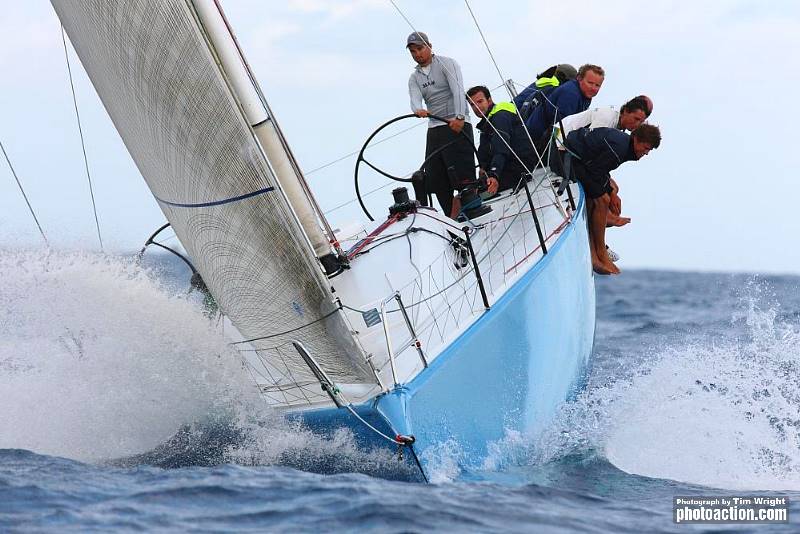
South Africa's Tokoloshe is heading for Cork Week in July
Mike Bartholomew explains why he is returning to Cork Week having missed the 2010 edition.
"At the start of the year, we planned out our season and Cork Week wasn't going to feature. However, we have changed our plans and will be in Crosshaven in July. The reason behind it is the relaxation of the rules about sailors classed as professionals. Tokoloshe is based in Hamble and most of the crew live in the village and work in the marine industry. None of them are paid to sail on Tokoloshe but because they are classed by ISAF as pros, this caused a major problem when entering Cork Week. I am delighted that the rules have been relaxed because we love coming to Cork Week, fantastic racing and a great atmosphere ashore, it really does tick all the boxes."
From Breskens, Holland Piet Vroon will be racing his Ker 46, Tonnerre de Breskens. 2010 RORC Yacht of the Year and Overall Round Ireland winner, Tonnerre has been one of the most successful yachts on the international racing circuit. Piet is now in his 80s and knows a thing or two about yacht racing. He has competed in 26 Fastnet Races, as skipper including last year's record-breaking race. Whilst Piet may well be one of the oldest competitors at Cork Week, his crew is composes of young aspiring sailors but none of them are paid to sail, that is Piet's way.
"I don't care much for the huge parties in the event village after racing but the boys love it. I prefer to relax in the evenings and get recharged for the next day's racing. The race management at Cork Week is first class and the variety of courses is excellent, one big advantage at Cork Week is that, besides the Harbour Course, there is very little tide, which means far better courses than say Cowes Week. I was introduced to Crosshaven by Dennis Doyle many years ago and I have been coming ever since."
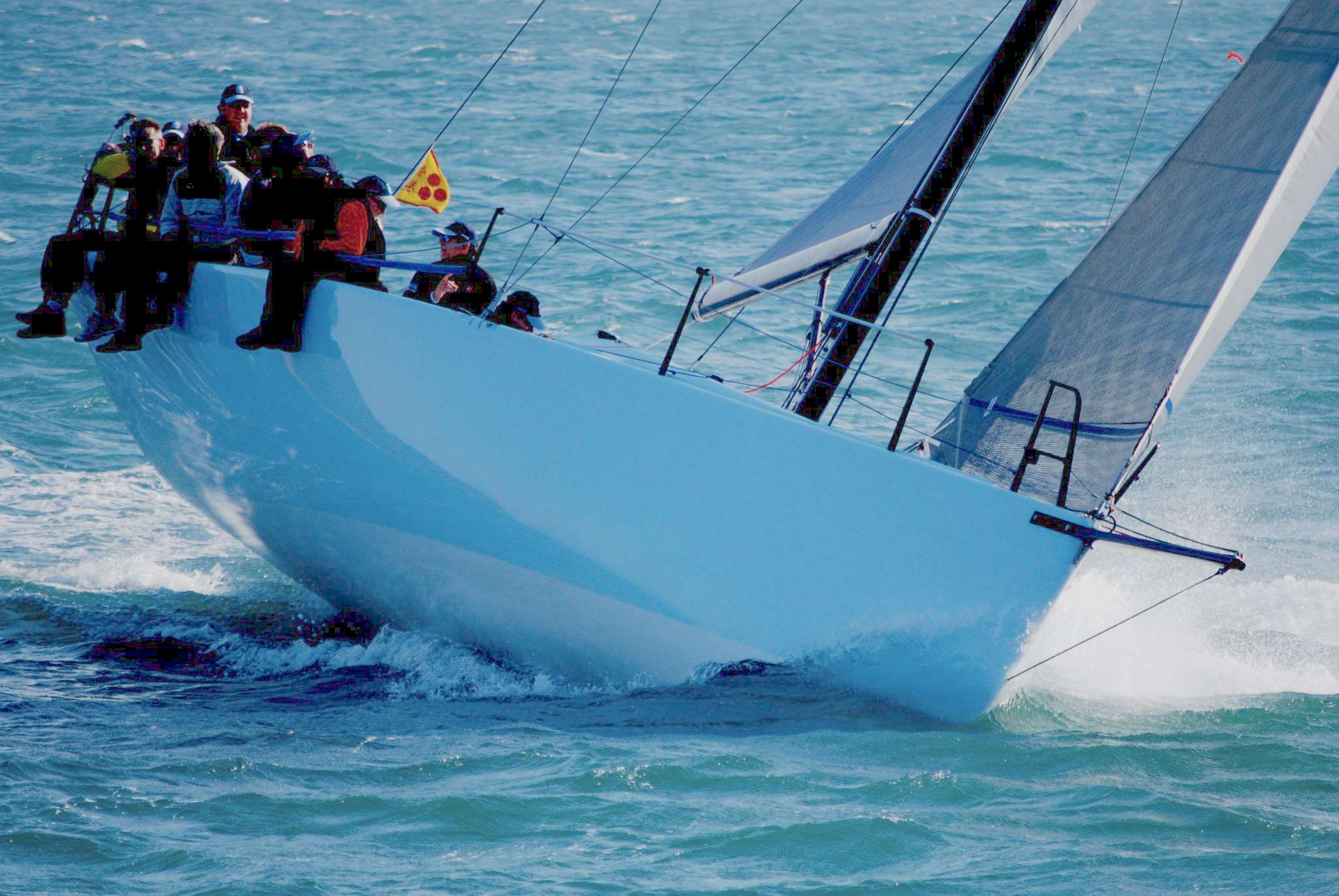
Jamie McWilliam returns from hong Kong with Signal 8
From Hong Kong, Cork Week will be welcoming back one of their son's Jamie McWilliam with his brand new Ker 40, Signal 8. The McWilliam family needs no introduction to Cork Week regulars. However, Jamie has lived in Hong Kong for many years and missed out in 2010.
"We plan to bring Signal 8 over to compete in the RORC IRC Nationals in June and we have an extensive programme throughout July with our sights firmly set on the Brewin Dolphin Commodores' Cup but Cork Week is most definitely a must.
The key ingredients to a successful regatta are great courses and excellent race management. There are other regattas that can match the superb range of courses at Cork Week but in my opinion, nobody does it better than Cork Week. If I was going to give competitors one good tip, it would be get some local knowledge on board. Back in 2000 on Swan 48 Jacobite, we were sailing towards the finish, rock hopping under Weaver's Point. Keith MacKeown was on board and his house was just yards from the finish line. Keith was lying on the foredeck with his head over the bow as we went in ducking the bricks, it made one hell of a difference to our result."
From Cape Town, South Africa Mike Bartholomew will be racing at Cork Week with his Mills 40, Tokoloshe. The sleek blue hull has been tremendously successful and was in fine form last year, winning the prestigious Britannia Cup at Cowes week. A previous winner of at the Scottish Series and RORC Easter Challenge, Tokoloshe has a fine racing pedigree and represented South Africa in the 2010 Rolex Commodores' Cup.
From Crosshaven, Ireland's Anthony O'Leary from the host club is delighted to be renewing old rivalries at the helm of his Ker 39, Antix.
"It is fantastic to hear that the South African King 40 Tokoloshe is coming to Cork Week and now that Jamie McWilliam will be bringing Signal 8 all the way from Hong Kong as well, it will make for a very competitive division. We three have been both sides of very close results in recent years and it is bound to be a real struggle on the water. Knowing Mike and Jamie, I am sure there will also be plenty of banter at the yacht club after racing!
To win at Cork Week, you have to race consistently well every day; the variety of courses evens out the design differences between the boats. I have no illusions, winning against good opposition is never easy but it makes racing at Cork Week all the more rewarding."
Lyons Hopes For a Special Cork Week in 2012
#CORK WEEK - Pat Lyons of Royal Cork Yacht Club has spoken to website The Cork News about the city's hopes for the 2012 Cork Week regatta.
Crosshaven in Cork Harbour will host the club's biggest regatta - which takes place every two years - from 7-13 July this summer.
“Sailing in Ireland and Cork is in great shape,” says Lyons, who is expecting more than 250 boats to pack the harbour for racing and more.
The event is also perfectly timed just two weeks ahead of the 2012 Olympic Games in London, where Royal Cork Yacht Clubman Peter O’Leary will vie for gold with Dublin yachtsman David Burrows in their two-man keelboat.
Though the economic downturn has had a serious effect, costs have been cut across the board and some rules have been relaxed to allow for the widest possible level of participation.
“There are three factors that make Cork special," says Lyons. "Firstly, there is the number of boats and the various fleets. Secondly, there are 10 races planned. While that doesn’t always pan out due to the weather, we have pretty settled weather conditions and an excellent coastline in Cork, with hills running down to the sea.
"And finally, there is the harbour, which, if the weather impacts, provides excellent shelter. We’ve always been able to achieve a higher level of competition than a lot of other regattas, with at least one or two races per day.”
As previously reported on Afloat.ie, preparations for the event have already kicked off with the launch of a dedicated new website.
The Cork News has more on the story HERE.
Dun Laoghaire Yacht Club 2012 Regatta Dates
#REGATTA–The four Dun Laoghaire waterfront Yacht Clubs have released their sailing regatta dates for 2012. In spite of many other racing fixtures on the bay the waterfront regattas remain a traditional favourite starting with the Dun Laoghaire Motor Yacht Club event on Saturday, June 9th.
Dun Laoghaire Yacht Club Regatta Calendar
Dun Laoghaire Motor Yacht Club Regatta 9th June
National Yacht Club Regatta 23rd June
Royal Irish Yacht Club Regatta 30th June
Royal St. George Yacht Club Regatta 7th July
Belfast Lough Regatta Dates for 2012
#BELFAST LOUGH - Provisional dates for the 2012 Belast Lough Yachting Conference (BLYC) Regattas have been announced.
The BLYC encompasses all yacht clubs on Belfast Lough and Larne Lough and co-ordinates their individual events.
The interim schedule for 2012 runs to nine events from Saturday 9 June to Saturday 25 August:
- Sat 9 June - Royal Ulster Yacht Club
- Sat 23 June - Ballyholme Yacht Club
- Sat 7 July - Holywood Yacht Club
- Sat 21 July - East Antrim Boat Club
- Sat 28 July - County Antrim Yacht Club
- Sat 4 August - Cockle Island Boat Club
- Sat 11 August - North of Ireland Yacht Club
- Sat 18 August - Donaghadee Sailing Club
- Sat 25 August - Carrickfergus Sailing Club
Limerick City Hosts Sprint Regatta
To celebrate Limerick’s designation as European City of Sport, the City will host an inter provincial sprint regatta that will see rowers from Munster, Leinster, Connacht and Ulster compete over a 400 metre sprint course between Sarsfield Bridge and the Shannon Bridge.
The racing will start at 15.00 and continue with races every five minutes until 17.00 taking advantage of the high tide at 17.15.
Each provincial team will consist of 12 senior men, 12 senior women, 12 junior men and 12 junior women making a total team of 48 plus 1 cox combining both sweep rowing and sculling.
A total of 24 races will be run at five minute intervals which will make for a very exciting visual spectacle harking back to the days when Limerick Regatta was held in the city centre and the city businesses closed down for a half day to let people go and enjoy the regatta.
The regatta is being supported by Limerick’s European City of Sport organizing committee and the supporting agencies Limerick City Council, Limerick County Council, Shannon Development and Limerick Regeneration have offered their full support to this festival of rowing.
Spectators will be able to view the races from both bridges and all along O’Callaghan’s Strand and Harvey’s Quay and Bishop’s Quay.
There will be live commentary on the races.
A barbeque for all participants will be hosted in Shannon Rowing Club at 18:00 and the presentation of prizes and the inaugural Limerick European City of Sport trophy to the winning province.
Dubliner Byrne Leads Denmark's Prince Henrik at Régates Royales
Dragon Edinburgh Cup winner Martin Byrne's impressive international form continues this week at the helm of Jaguar. The Dublin sailor leads HRH Prince Henrik of Denmark for overall honours at the Régates Royales in Cannes, on the south of France. Byrne, the Commodore of Dun Laoghaire's Royal St. George Yacht Club is counting a 1, 1 and 3 in the 58-boat fleet. 'We're off to a good start' Byrne, the Irish Dragon national champion, told Afloat.ie this morning. July's Edinburgh Cup winner is sailing with Brian Mathews and Portuguese sail maker Andrade Pedro.
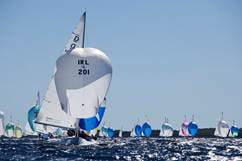
Martin Byrne leads the 58-boat fleet
After the fleet could not go out on the water on Monday because of the strong, gusty typical Mistral breeze, the 58 boat strong Dragon fleet had three windward/leeward races on Tuesday starting in a 12 knots south-westerly, that progressively increased during the afternoon hours, topping 20 knots. Competition was strong as usual for the top positions and the class' champions imposed their supremacy. The first two races went both to Dublin's Byrne on Jaguar Bear who managed to get the better of reigning champion and class master Anatoly Longinov on Annapurna and on multiple class winner Danish Poul Richard on Antigua's flagged Danish Blue on the first one. A nearly clean score for the Irish skipper who was third in the last race of the day won by Ian Bradbury on Blue Haze. HRH Prince Heinrik of Denmark's had a very positive first day with a sixth, a second and a fourth. With five points, the Irish team is then securely on top of the provisional podium, in front of HRH Prince Henrik of Denmark (13 points) and the Russian crew skippered by Anatoly Loginov (16 points).


























